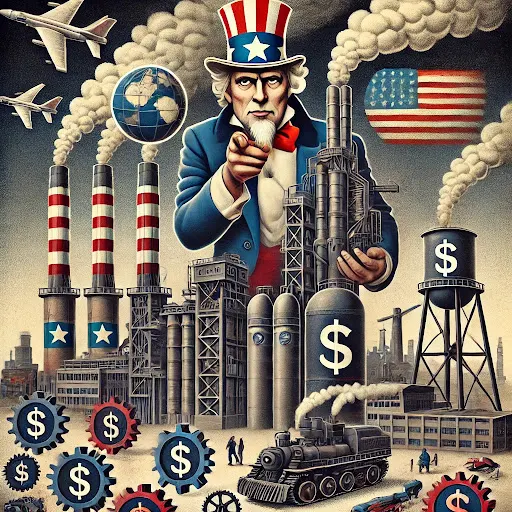The Eternal Battlefield: America's Unending Romance with War
"The Eternal Battlefield: America's Unending Romance with War"
Byline: A Critical Examination of History, Economy, and Identity
Introduction: The War Machine's Heartbeat
1. Historical Roots: From Manifest Destiny to Global Policeman
America’s expansionist ethos, rooted in "Manifest Destiny," normalized conflict as a means of territorial and ideological conquest. The 19th-century Indian Wars, the Mexican-American War, and World War II’s industrial mobilization cemented war as a catalyst for growth. Post-1945, the Cold War institutionalized military spending, with the Department of War rebranded as the "Department of Defense"—a semantic shift masking perpetual readiness for conflict.
The post-9/11 era saw this legacy escalate. The "War on Terror" birthed sprawling interventions in Afghanistan and Iraq, costing trillions and embedding war into the national psyche. As former Defense Secretary Chuck Hagel once admitted, "We’re ready to go the moment the president wishes."
2. Economic Addiction: The Military-Industrial Complex
War is America’s most lucrative industry. President Eisenhower’s 1961 warning about the "military-industrial complex" proved prophetic: defense contractors like Lockheed Martin and Raytheon wield outsized political influence, with the U.S. accounting for 43% of global weapons exports over the past five years. The economy thrives on conflict—from jobs in manufacturing to tech innovation driven by Pentagon contracts.
Even "peacetime" is a misnomer. The 2013 push to bomb Syria, despite public opposition, highlighted how war machinery resists inertia. As business pundit Paul Farrell noted, "America’s economy is a war economy… War drives our entrepreneurial spirit."
3. Cultural Mythology: Glory, Unity, and Exceptionalism
War narratives dominate American culture, from Hollywood blockbusters to political rhetoric. The "good war" mythos—exemplified by WWII’s "Greatest Generation"—contrasts with the messy reality of Vietnam or Iraq. Yet, war remains a unifying force in divided times. After 9/11, President George W. Bush’s approval ratings soared to 90%, illustrating how crisis galvanizes patriotism.
Comedian George Carlin quipped, "We’re not good at anything else anymore… but we can bomb the shit out of any country." This dark humor underscores a societal truth: war is a source of pride, a proof of "exceptionalism" in a chaotic world.
4. Modern Case Studies: Ukraine and the Shadow of Project 2025
-
Ukraine (2022–2025): The U.S. has funneled billions into Ukraine’s defense, framing it as a stand against authoritarianism. However, President Trump's recent decision to halt military aid to Ukraine has raised concerns among European allies about the reliability of U.S. support.
-
Project 2025: This Heritage Foundation blueprint envisions a hyper-militarized executive branch, with proposals to "aggressively construct a border wall" and expand presidential war powers. Critics warn it could normalize perpetual conflict under the guise of "national security."
5. The Paradox of Peace: Can the Cycle Break?
While violence has declined globally, America’s war footing persists. Evolutionary psychologist Mike Martin argues that larger social groups reduce conflict, yet the U.S. resists ceding power to global bodies like the UN. Meanwhile, initiatives like the ACLU’s fight against Project 2025 highlight grassroots resistance to militarized governance.
But hope is fragile. As the World Economic Forum warns, America’s dominance relies on "technological edge and the world’s reserve currency"—both tied to military hegemony. Without systemic change, war remains the default setting.
Conclusion: A Nation at War with Itself
America’s dependency on war is not inevitable but engineered—a product of history, profit, and myth. To escape this cycle, the nation must reckon with its addiction to conflict and redefine strength beyond the battlefield. Until then, the drums of war will keep beating, echoing Carlin’s grim punchline: "War is the ultimate reality show—and we’re all contestants."
—
For further reading, explore the sources cited in this analysis or dive into the full debate on Blogs of War.



Comments
Post a Comment
Thanks for messaging Aradhya Study Point.
We will reply as soon as possible.